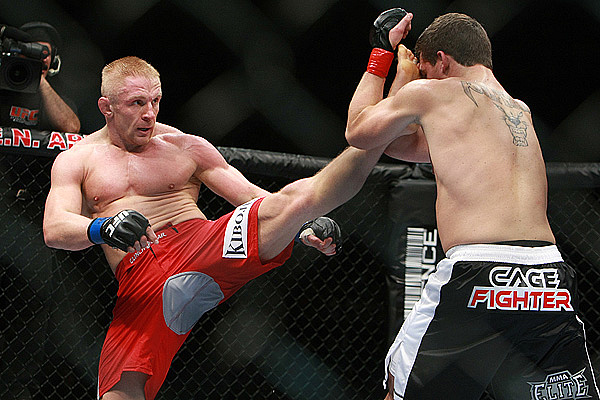At Home in the Cage
No Place Like Home
Tim Leidecker Jun 30, 2011

Dennis Siver (left) has transformed into a legitimate 155-pound
contender. | Photo: Dave Mandel/Sherdog.com
To understand UFC lightweight contender Dennis Siver, one has to undertake a brief excursion into German history.
Siver was born in Omsk, Russia, in 1979. The city, which serves as the junction point for the northern and southern branches of the Trans-Siberian Railway, was erected in 1716 by Johann D. Buchholz, a Lieutenant Colonel in the Imperial Russian Army with German roots. The city that today is home to 1.2 million people attracted countless German homesteaders at the end of the 19th century. Another large German group was deported to Omsk by Joseph Stalin in 1941 during the World War II.
Advertisement
“I remember my school years, my friends, the city I lived in and, of course, my martial arts beginnings,” Siver says, recounting his childhood memories in Russia for Sherdog.com. “I came to Germany when I was 17. The first years [were not] easy, until I had learned the language to some extent, but thanks to the sport and the new friends and acquaintances, the sense of well-being quickly went uphill.”
Siver still has relatives in Omsk, but visiting them has been
difficult; the quickest flight connection for the 2,675-mile trip
takes eight hours.
“I still have some aunts and uncles there, but, unfortunately, I don’t get to visit them very often because I just don’t have the time for it, as I’m always busy training or fighting,” he says.
He faces a personal quandary every day, as Siver admits he does not feel truly at home in either place. In Russia, he is considered German; in Germany, he is considered Russian.
“Personally, I consider myself more of a German because I got used to the life here,” Siver says. “I still have a strong bond to my country of origin, though. We cook Russian dishes often and also speak the language at home.”
Because of his background and his reserved, modest and quiet nature, Siver makes it difficult for fans to really rally behind him. The general consensus in the German mixed martial arts community is that even though he is ultimately loved by few, he is universally respected.

Siver fondly remembers his humble roots in Omsk, Russia. |
Photo: WENN.com
German fans and media have shown a remarkable ability to get behind virtually anybody enjoying success. In the same mold, the vogue of the stocky kickboxer has risen, as well, after his tactically masterful defeat of Brazilian jiu-jitsu black belt George Sotiropoulos in front of the Aussie’s home crowd at UFC 127 in February.
The unlikely win -- his seventh in his last eight fights -- propelled the Kiboju fighter into the Top 10 in the UFC lightweight rankings. It had not always been like that. The start to his UFC career was rather bumpy, with three losses in his first four fights. The turning point came when he was temporarily released from the promotion and decided to go for broke by quitting his day job as an auto mechanic.
“In my first UFC fights, I wasn’t a real pro yet,” Siver says. “I still had to work, and the training suffered a lot from that. I had a little bit of bad luck, as well. The watershed was having more time to train and more time to rest, plus the experience I had gained. I tried improving on the mistakes I had made and concentrating more on my future opponents.”
To improve, Siver started to think outside the box in terms of training. While a trip to Xtreme Couture Mixed Martial Arts in Las Vegas ahead of UFC 99 did not appeal to him, the striker diversified his training at home in Germany. He now splits his time between his longtime main gym Kiboju in Mannheim -- with head coach Niko Sulenta -- and working with former opponent Daniel Weichel and Christian Eckerlin at Team MMA Spirit in Frankfurt. He also trains Brazilian jiu-jitsu at the Alliance gym in the Hessian city. Trainers and teammates have nothing but praise for the 11-time UFC veteran.
“Dennis is training Brazilian jiu-jitsu with us once a week and has since been promoted to purple belt,” says Henry Navorra, a Fabio Gurgel black belt. “I want to emphasize that Dennis is training mostly with the gi and that his Brazilian jiu-jitsu is a highly underrated facet of his game. His jiu-jitsu has evolved greatly in the last couple of years, especially when it comes to passing the guard, taking the back and putting pressure on his opponent from various positions. Overall, Dennis has a very good jiu-jitsu game, which is boosted by his explosiveness and power.
“What makes Dennis special is that even though he has become very successful in the UFC during the last couple of years, he has remained the same down-to-earth, low-key guy he was before,” Navorra adds. “He is part of our team, and everybody at Alliance is very proud of his accomplishments.”
M-1 Challenge veteran Eckerlin takes a similar line.
“Dennis is a very quiet guy who always approaches things in a no-nonsense way. You can groove with him, but in training, he’s a machine,” Eckerlin says. “His standup has improved a lot, as has his ground game. What makes him special is that he always gives 120 percent; he never gives up. He’s a real fighting machine and a fantastic training partner that I’ve learned a lot from already.”
Continue Reading » Dennis Siver: Facing Wiman
Related Articles







